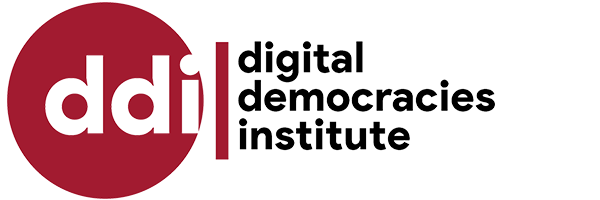
The Digital Democracies Institute (DDI) at Simon Fraser University (SFU) integrates research in the humanities, social sciences, network and data sciences to address questions of equality, justice and democratic dialogue. Our long-term goal is to combat the proliferation of online polarization, abusive language, and discriminatory algorithms by producing alternative data literacies and paradigms for connection. Our projects range from critical, historical and technical analyses of misinformation, to the creation of responsible AI systems to help transform hostile social media exchanges into productive dialogues, to the development of new prototypes of connection based on critical ethnic studies and indigenous epistemologies. We are also a global hub and platform for collaborative research on the effects of social media on democratic practice.
We work across disciplines and sectors because we have to: despite the best efforts of specialists in various disciplines and sectors, the problems of misinformation, radicalization, echo chambers, and abusive language persist. Traditional boundaries have restricted the impact of this work, which has meant that insights into these problems are often replicated and not shared; solutions that depend on insights from another discipline are not considered–something we are working to counteract.
So what does this look like in practice? Within the DDI there are four research streams:
1) Beyond Verification: Authenticity and the Spread of Mis/disinformation which aims to understand why and how misinformation spreads and develop methods to counter its spread;
2) From Hate to Agonism: Fostering Democratic Exchange Online which combats abusive language and foster democracy through counter speech;
3) Desegregating Network Neighborhoods, working to understand and defuse network polarization; and
4) Discriminating Data: Individuals, Proxies, Neighborhoods, which diagnoses and contests algorithmic discrimination.
Each of these streams starts with a roadblock or problem that seems insurmountable.:
- “Beyond Verification” starts from the fact that fact-checking is important, but not enough. Not only do fact-checking sites always lag behind the global and viral spread of mis-/disinformation, users often spread stories they find funny, compelling or outrageous irrespective of their facticity. Further, the more certain politicians lie, the more authentic they appear. Thus, to understand how and why misinformation spreads, we need to address the complex relationship between factuality, trust, authenticity and authority. Our project thus asks: “how and under what circumstances–social, cultural, historical, and technical–information is deemed ‘truthful”?
- Debates around abusive language usually present the issue as a choice between freedom of expression and the protection of “others.” This misses the fact that the same groups are often targeted by both sides: LGBTQ+ activists, for example, were one of the first groups censored online and the focus of much hate speech. To address this situation, “From Hate to Agonism” works with those targeted groups to produce context-aware, dynamic systems that foster user- and community-based empowerment. Democracy entails conflict, but not hate.
- “Desegregating Network Neighborhoods” starts by acknowledging that echo chambers and aren’t an unfortunate accident, they’re the goal. If networks are based on homophily—the concept that similarity breeds connection—then polarization is the result. To prevent this, this projects prototypes different kinds of connection, from opposites to ambivalence, to produce networks that enable us to live in/difference.
- “Discriminating Data” investigates the centrality of race, gender, class and sexuality to big data and network analytics. Unpacking key technical concepts—from correlation to proxies, factor analysis to deep learning—it reveals how these principles often foster acrimony and segregation through their default assumptions and conditions, defaults that amplify the societal and human prejudices that they were developed to combat.
These four research streams are led by Dr. Hui Kyong Chun, Simon Fraser University’s Canada 150 Research Chair in New Media and Professor of Communication, and supported by both the internal research team and across external working groups and forums which meet regularly. Within the lab there are currently four post-doctoral fellows, five PhD students, two MA students, and four undergraduate research assistants working on research, supported by an administrative and tech support team. We also foster close collaborations with SFU-based faculty and support work produced across the University. In forthcoming articles we will examine these topics in more detail as to what the streams entail, and also introduce the teams that work on them.
External affiliations are a key part of the success of the research, and involve people from all over the world with complementary skills and knowledge. We lead four successful grants (from Canada 150 Research Chairs Program, UK-Canada AI Initiative, Social Science Research Council, and John R. Evans Leadership Fund) and work with teams in Canada, the US, New Zealand, and the UK.
The DDI started as the Digital Democracies Group, which Dr. Chun moved to SFU to start after from almost two decades at Brown University in 2019. In May 2019 to launch the Group we held a three day conference in Vancouver, which brought together the leading international and national researchers to mobilize knowledge, and also to generate new research themes and collaborations. You can watch presentations from some of the speakers here. This sold out conference was a fantastic stage to launch our research, and we aim to hold conferences again in the future to foster similar outcomes, either virtually or in real time where feasible. We have regular presentations from affiliates, and will be publishing material from them on Medium where possible. In the last year and 8 months, the DDI has grown from a close-knit nucleus to today’s widespread network, which continues to grow as our research develops. If you are interested in reading more about the work we do, further articles will be published here in due course, and you can find more information on our website here.
